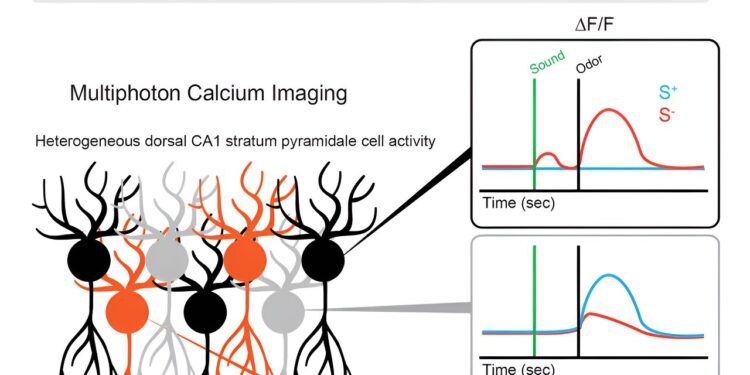Credit: Current biology (2024). DOI: 10.1016/j.cub.2024.01.021
Researchers at the University of Colorado Anschutz Medical Campus have found that odors stimulate specific brain cells that may play a role in making quick “go or no go” decisions.
The study was published online Tuesday February 6 in the journal Current biology.
The scientists focused on the hippocampus, an area of the brain crucial for memory and learning. They knew that “temporal cells” played a major role in hippocampal function, but did not know their role in associative learning.
“These are cells that would remind you to make a decision: Do this or that,” said the study’s lead author, Diego Restrepo, Ph.D., a neuroscientist and professor of cellular and developmental biology at the Faculty of Medicine. Medicine from the University of Colorado. .
The researchers observed that when mice were given the choice to respond to a fruity odor by licking a spout that delivered sugar water, they quickly learned to lick the fruity odor rather than the mineral oil odor.
“They have to associate the smell with the outcome of what they do, which is why they learn to make decisions,” said Ming Ma, Ph.D., first author of the study and senior instructor in cell biology. and developmental at university. the CU School of Medicine. “When it’s a fruit scent, they lick and get a reward. When it’s mineral oil, they stop licking.”
“The more they learned, the more cells were stimulated, which led to faster decoding of odors and allowed the mice to quickly become proficient in choosing the fruity odor,” said Fabio Simoes de Souza, DSc, a other first author of the study. and assistant research professor of cellular and developmental biology at the CU School of Medicine.
The catalyst for decision making is the smell that travels up the nose and sends neural signals to the olfactory bulb and hippocampus. The two organs are closely linked. The information is processed quickly and the brain makes a decision based on the information received.
“Before this, we didn’t know there were decision-making cells in the hippocampus,” Restrepo said. “The hippocampus multitasks.”
The cells aren’t always on, Restrepo speculates, because otherwise the stimuli could become overwhelming.
The study expands current knowledge about what is involved in decision-making in the brain, particularly the quick go-or-no-go decisions that mice and humans make all the time.
“The hippocampus activates temporal decision cells that would give you an idea of what to remember,” Restrepo said. “In the past, it was thought that temporal cells only reminded you of events and time. Here we see the memory encoded in neurons, then retrieved instantly when making a decision.”
More information:
Ming Ma et al, Sequential activity of hippocampal CA1 cells constitutes a temporal memory map for associative learning in mice, Current biology (2024). DOI: 10.1016/j.cub.2024.01.021
Provided by CU Anschutz Medical Campus
Quote: Smells can prompt certain brain cells to make decisions (February 6, 2024) retrieved February 6, 2024 from
This document is subject to copyright. Apart from fair use for private study or research purposes, no part may be reproduced without written permission. The content is provided for information only.



